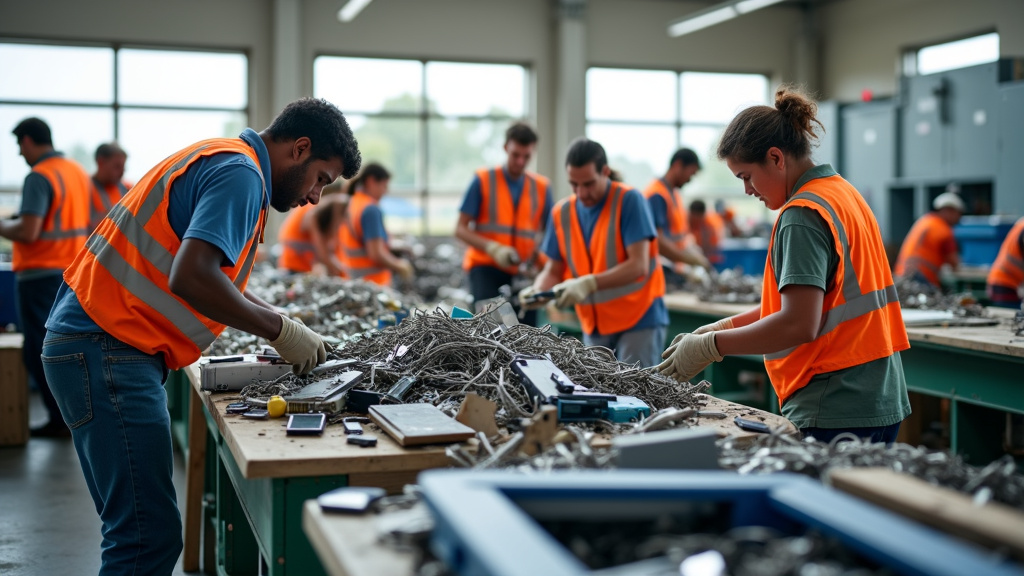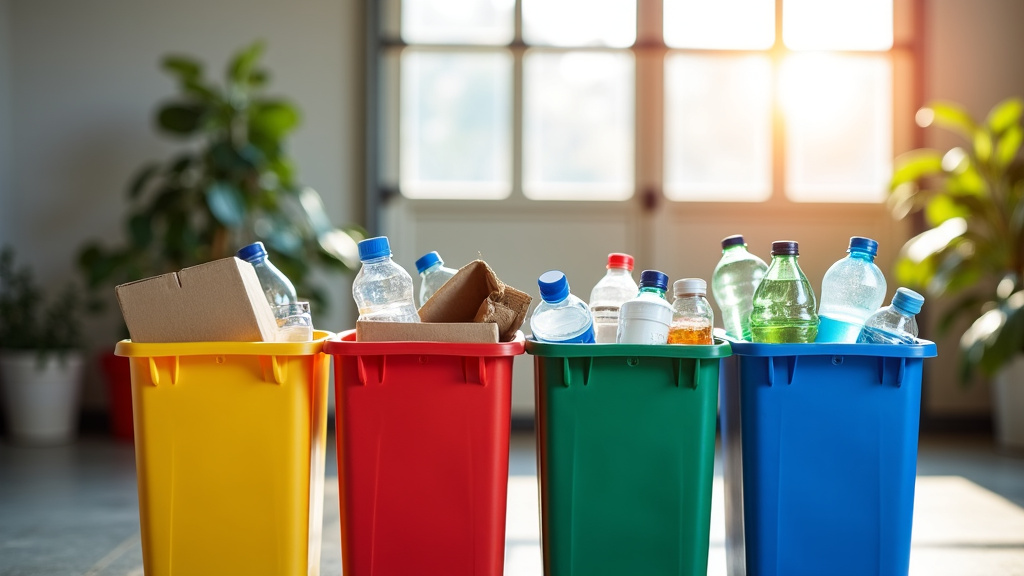5901 Botham Jean Blvd, Dallas, TX 75215
How to Participate in Community Scrap Drives
February 11, 2025Did you know that recycling just one ton of scrap metal saves 3,000 pounds of ore from being mined? That’s the power of community scrap drives—local initiatives that do more than just clear out garages; they actively support a more sustainable planet.
These events are a cornerstone of environmental responsibility, blending civic engagement with real ecological impact. By participating, you’re not only decluttering but also contributing to resource conservation and waste reduction.
Getting involved is simple. Stay informed through local news, social media, and community boards to find upcoming scrap drives. Many metal recycling centers, like Okon Recycling, organize these events regularly, making it easy to recycle old appliances, tools, and other scrap materials responsibly.
But scrap drives aren’t just about recycling—they’re about community. They bring neighbors together, turning sustainability into a shared mission. Whether it’s swapping stories over piles of old equipment or collaborating on a common cause, these events help strengthen local connections while making a tangible environmental difference.
So next time you see a flyer for a scrap drive, take a moment to consider the impact. It’s a chance to be responsible, get involved, and maybe even have a little fun—because sustainability is a collective effort, and every contribution counts.
Identifying and Coordinating with Local Organizations

Local non-profits and community groups play a crucial role in organizing scrap drives, serving as the backbone of grassroots recycling efforts. These organizations are deeply embedded in their communities, understanding local needs and challenges. By partnering with them, you can enhance the impact of your recycling contributions and ensure materials are processed efficiently.
Many community-driven scrap drives focus on specific items, allowing for targeted waste reduction efforts. For instance, e-waste recycling events have gained popularity, addressing the growing concern of electronic waste. These events provide a safe and convenient way to dispose of old electronics while contributing to a sustainable future.
Similarly, scrap metal drives organized by local groups can significantly impact recycling efforts. These initiatives not only help clear out unwanted metal items from homes and businesses but also contribute to resource conservation. The collective action of community members can lead to substantial amounts of metal being diverted from landfills and repurposed.
Benefits of Coordinating with Local Organizations
When you coordinate with local non-profits and community groups for scrap drives, you tap into numerous benefits. These organizations often have established networks and resources that can streamline the collection and recycling process. Their local knowledge and connections can help overcome logistical challenges and ensure maximum participation from the community.
Moreover, these groups can provide valuable education and awareness about the importance of recycling. They often incorporate informational sessions and demonstrations into their events, helping participants understand the impact of their contributions. This educational aspect is crucial in fostering long-term sustainable habits within the community.
Local organizations also have the advantage of tailoring their efforts to specific community needs. For example, in areas with a high concentration of electronic manufacturers, they might focus more on e-waste collection. In contrast, regions with significant industrial activity might emphasize scrap metal recycling.
Success Stories and Community Impact
Numerous success stories highlight the effectiveness of local organization-led scrap drives. For instance, a community in the Midwest organized a series of targeted e-waste collection events that resulted in over 50 tons of electronic waste being properly recycled in just one year. This initiative not only prevented harmful materials from entering landfills but also recovered valuable resources for reuse.
Another inspiring example comes from a coastal town where a local environmental group coordinated with fishing communities to collect and recycle old fishing gear. This effort not only cleaned up the shoreline but also raised awareness about marine pollution, leading to long-term changes in waste management practices among local fishermen.
Getting Involved and Making a Difference
If you are looking to contribute to or organize a scrap drive in your area, start by reaching out to local non-profits and community groups. Many organizations welcome volunteers and are often seeking partnerships to expand their recycling initiatives. You can find these groups through online searches, community bulletin boards, or by contacting your local government’s environmental department.
Remember, every contribution counts. Whether you are donating your old electronics to an e-waste drive or helping to organize a neighborhood scrap metal collection, your efforts make a tangible difference in reducing waste and conserving resources. By working together with local organizations, we can create a more sustainable future for our communities and the planet.
Best Practices for Community Participation

Effective participation in recycling drives depends on understanding the intricacies of proper waste sorting and preparation. By mastering these skills, community members can significantly boost the efficiency of collection efforts and foster a culture of environmental stewardship. Here are some key strategies to enhance your recycling efforts and inspire others to join the cause.
Know Your Materials: The Foundation of Effective Recycling
Before placing items in the recycling bin, it’s crucial to familiarize yourself with what’s acceptable in your local program. Not all materials are created equal when it comes to recyclability. For instance, while most communities accept paper and cardboard, the rules for plastics can vary widely.
The Environmental Protection Agency (EPA) offers a comprehensive guide on common recyclables, which can serve as an excellent starting point. However, it’s always best to check with your local recycling coordinator for specific guidelines tailored to your area.
Remember, contamination from non-recyclable items can render entire batches of recyclables unusable. By taking the time to educate yourself, you’re not just sorting trash – you’re safeguarding the entire recycling process.
Preparation is Key: Maximizing Recycling Efficiency
Once you’ve identified recyclable items, proper preparation is the next critical step. This process isn’t just about cleanliness; it’s about optimizing the recycling stream for maximum efficiency. Here are some best practices to keep in mind:
- Rinse containers to remove food residue
- Remove caps and lids from bottles and jars
- Flatten cardboard boxes to save space
- Keep paper dry and free from food contamination
- Separate different types of materials (e.g., paper from plastics)
These simple steps can dramatically improve the quality of recyclables, making the sorting process at recycling facilities smoother and more effective. It’s not just about recycling more – it’s about recycling smarter.
Spreading the Word: Amplifying Community Involvement
Individual efforts are commendable, but community-wide participation is where real change happens. As an engaged citizen, you have the power to inspire others and create a ripple effect of positive environmental action. Here’s how you can spread awareness:
Start conversations with neighbors about recycling practices. Share tips and tricks you’ve learned, and be open to learning from others. Social media platforms can be powerful tools for disseminating information quickly. Consider creating a community group dedicated to recycling and sustainability efforts.
Lead by example. When others see your commitment to proper recycling, they’re more likely to follow suit. Don’t be shy about sharing your recycling journey – your enthusiasm can be contagious!
The Checklist: Your Guide to Recycling Success
To help you and your community members stay on track, here’s a handy checklist for effective recycling participation:
- Verify acceptable materials with local guidelines
- Clean and prepare items before recycling
- Sort materials into appropriate categories
- Flatten boxes and containers to save space
- Educate family members on proper recycling practices
- Share recycling tips with neighbors and friends
- Stay updated on local recycling news and changes
By following these best practices, you’re not just participating in a recycling drive – you’re becoming a catalyst for positive environmental change in your community. Remember, every properly recycled item is a step towards a more sustainable future. Let’s make every piece count!
Final Words: Understanding the Impact of Community Scrap Drives
Community scrap drives are more than just recycling events—they’re powerful drivers of environmental change. By repurposing materials that would otherwise end up in landfills, these initiatives conserve natural resources, reduce waste, and contribute to a more sustainable future.
But the impact of scrap drives extends beyond waste reduction. These events unite communities, fostering a shared sense of responsibility and teamwork. Coming together for a common cause strengthens communal bonds and reinforces the idea that sustainability is a collective effort.
Participating in a scrap drive can be eye-opening, often inspiring individuals to adopt more sustainable habits, from reducing single-use plastics to making more eco-conscious purchasing decisions. The ripple effect of these efforts can lead to long-term environmental awareness and action.
Reflecting on the significance of scrap drives, it’s clear that their value extends far beyond recycling. They cultivate a culture of sustainability, empowering individuals and communities to take an active role in protecting our planet. The sense of achievement from a successful scrap drive can be the spark that fuels lasting change.
Ready to take action? Whether you’re organizing a scrap drive or looking to participate, Okon Recycling is here to help. Contact 214-426-6566 to learn how you can get involved and make a meaningful impact on your community and the environment—one scrap drive at a time.
